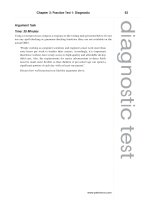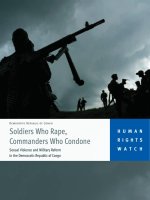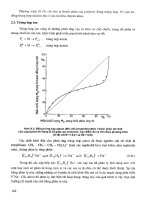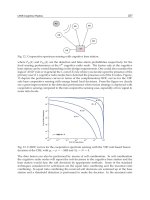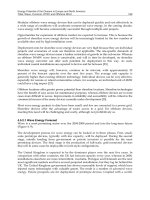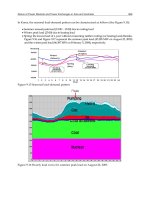IN THE COMMON DEFENSE Part 9 potx
Bạn đang xem bản rút gọn của tài liệu. Xem và tải ngay bản đầy đủ của tài liệu tại đây (198.57 KB, 42 trang )
P1: KOD
0521877636Xc10 CUFX132/Baker 0 521 87763 6 March 21, 2007 9:10
The National Security Lawyer 321
In a judicial model, the attorney might ask additional questions. What
is the potential for collateral consequences? And, what is the basis for the
difference in intelligence opinion? He would then apply the law to the facts
as they are known to determine whether a strike is lawful under U.S. and
international law. To the extent the attorney believes the target is “unlawful”
under U.S. law he would indicate so, and if necessary, advise the president
that he could not in good faith approve the target.
Under an advisory model, the attorney might advise the president as
to the legal standard and defer to the president’s judgment on the appli-
cation of law to fact. Under the public interest model, the attorney might
consider what is in the best interest of the United States or the public. Pre-
sumably this interest would revolve around getting the facts right, but also
taking all measures necessary to defend the country, erring on the side of
security.
The attorney should play all of these roles. First, under any rubric the
attorney has a duty to resolve the factual ambiguity. Arguably, under an
advocacy model, the attorney might sit back and defer to the president’s
view of the law and facts and then defend both. However, it is not clear
how such inaction would represent zealous or diligent representation. The
president would still require knowledge of the facts and the law to faith-
fully execute his security functions. Moreover, under the advocacy model,
even if the attorney were poised to validate the president’s judgment, he
would still need to know the counterarguments to better represent the
president’s choice. Thus, the question is how best to do so in a manner
that respects the role of the president as commander in chief and chief
executive.
The hypothetical also illustrates the potential range of duties, functions,
and choices the attorney might (and in my view should) address in a given
scenario. The national security lawyer has a duty to guide decisionmakers
toward legally available options. In performing this function in a timely and
meaningful manner, the lawyer provides for our physical security. In doing
it faithfully, based on honest belief on the application of law, he provides for
the security of our way of life, which is to say, a process of decision founded
on respect for the law and subject to law.
The hypothetical presents threshold questions of authority. Therefore,
the attorney must consider whether the president has the constitutional au-
thority to authorize the missile strike. As the president is also, in effect, ap-
proving a specific military target while authorizing the initial resort to force
the attorney should run through a three-pronged substantive template:
(1) Does the president have the constitutional authority to use force, and is it
subject to a statutory overlay? If so, must or should the president consult
with the Congress, or notify the Congress in advance?
P1: KOD
0521877636Xc10 CUFX132/Baker 0 521 87763 6 March 21, 2007 9:10
322 In the Common Defense
(2) Is the use of force a lawful exercise in self-defense, anticipatory self-
defense, or preemption? Will such an assertion be viewed as contro-
versial? And, what are the legal policy ramifications of U.S. decision?
(3) Is the president’s selection of targets and the means and methods of attack
consistent with the law of armed conflict as reflected in U.S. and inter-
national law?
The attorney should also consider a procedural template:
(1) Who must authorize the use of force?
(2) Must the attorney general be informed? Should the attorney general be
informed? If not, or if so, who must/should make that decision?
(3) Is the president aware of the factual dispute? If not, whose duty is it to
inform him?
(4) Must the factual dispute be resolved before authorization may be given?
If so, how can it be resolved in the timeline presented?
These questions present a mix of fact and law, law and legal policy, as well
as substance and process. There are no textbook answers. There are clearly
wrong answers. There are as well, as a matter of legal policy, preferred
answers. One solution: the lawyer can identify the parameters of the factual
dispute and ensure that they are framed and communicated within any
decisional documents going to the president. But it is two in the morning.
The president has already made his decision, without knowing that the facts
are sliding. One solution: the president’s lawyer can call the national security
advisor and identify the problem and a solution – a conference call with the
DNI, national security advisor, and the secretary of defense to determine if
the facts are sliding or whether analysts are rehashing judgments already
made at the top, without their knowledge. Does the DNI stand by the
intelligence and intelligence judgment or not? And if there is any shift in
fact or analysis, is the president and the military chain of command aware?
The scenario continues. With the input and concurrence of the attor-
ney general, the DNI, and the secretary of defense, the president decides to
authorize the strike. The lawyer now becomes advocate. He clears talking
points for use with the Congress, the media, and foreign governments, con-
scious that the talking points, as opposed to the advice rendered in advance
of decision, will shape outside perspectives on the validity of U.S. assertions
of authority. As a matter of legal policy, will this be cast in the language of pre-
emption, anticipatory self-defense, self-defense, or under some other rubric?
In doing so, he considers what information if any can be disclosed in support
of the intelligence link between the target and terrorism. He adds bullets on
the legal basis for the strike, not as judge or advisor, reflecting the best argu-
ments on both sides, but as advocate, presenting the arguments in support
P1: KOD
0521877636Xc10 CUFX132/Baker 0 521 87763 6 March 21, 2007 9:10
The National Security Lawyer 323
of action. Bigot list permitting, the lawyer ensures the State Department
is generating an Article 51 report to the United Nations identifying the U.S.
legal position as one of self-defense.
The strike occurs. The lawyer now shifts to the role of advisor appraising
the process. What worked well and what didn’t work well? Could the fac-
tual dispute have been resolved through alternative process, or was it only
identified and forced to the surface through the presentation of decision?
Should the president retain case-specific decision authority over compara-
ble strikes, or authorize such strikes in concept in the future and if so subject
to what qualifications in policy, law, and legal policy? Is this a question of
law, or of command preference that should be dictated by operational need
and presidential style?
The hypothetical also illustrates the extent to which the application of
national security law and process is dependent on culture, personality, and
style. The president can direct legal review of his decisions, but if a national
security advisor is not committed to such a review, it will not occur in a
meaningful manner, if at all. The process would have failed if the lawyer
did not make the call or if the national security advisor would not take the
call. In short, it is not the presence of counsel at the NSC, the White House,
or the Defense Department that upholds the law. It is the active presence
of a president, a national security advisor, and department secretaries who
insist on legal input in the decision-making process and lawyers who will
place their integrity and careers on the line to provide it.
An indeterminate conflict, of indefinite duration, against unknown enemies
and known enemies unseen will put uncommon strain on U.S. national secu-
rity. It will also put uncommon strain on principles of liberty. If we meet this
day’s threats without destroying the fabric of our constitutional liberty it
will be through the effective and meaningful application of national security
law.
The sine qua non for broad national security authority is meaningful
oversight. By oversight, I mean the considered application of constitutional
structure, executive process, legal substance, and relevant review of decision-
making – all of which depend on the integrity and judgment of lawyers. It
is lawyers who will help us find the right combination of broad executive
authority to defeat terrorism with the considered application of law before
action and subsequent appraisal to protect our liberty. So whether one likes
law or not, it is central to national security. Lawyers and not just generals
will decide the outcome of this conflict.
Lawyers reside at the intersection where physical safety and liberty
merge. In this role they are indispensable to good process and should feel a
duty to advocate good process. Good process permits the faithful application
P1: KOD
0521877636Xc10 CUFX132/Baker 0 521 87763 6 March 21, 2007 9:10
324 In the Common Defense
of the law and the accomplishment of the security objectives. In any given
context, the pressure of the moment may encourage short-term thinking
and the adoption of process shortcuts. The lawyer alone may be sufficiently
detached from the policy outcome to identify the enduring institutional con-
sequences of a particular course of action. So too, the lawyer alone may be
familiar, and may feel an obligation to be familiar, with applicable written
procedures. Process is substance if it means critical actors and perspectives
are omitted from the discussion table.
Good process is not antithetical to timely decisions, operational time-
lines, or to secrecy. Process must find the right balance between speed and
strength, secrecy and input. But process can always meet deadlines. There is
no excuse for shortcuts. Process can be made to work faster and smarter. By
example, if legal review is warranted, the attorney general alone can review
a matter and, if need be, do so while sitting next to the president in the Oval
Office.
Third, process should be contextual. The legal and policy parameters for
responding to terrorism are different from those for responding to a Balkan
crisis. Clandestine and remote military operations against a hidden enemy
will dictate different decision processes than NATO air operations against
fixed targets, as will the different political and policy parameters of both
situations. One has to maintain situational awareness, to find the measure
of process and approval that ensures law is applied in a manner that is
faithful to constitutional, statutory, and executive dictates and that meets
operational timelines. Therefore, there will always be some tension as to
who should see what when.
Finally, lawyers support and defend the Constitution and not just the
policies of their government. It is not clear how a president can faithfully
apply the law without faithfully applying the constitutional principles identi-
fied in Chapters 3 and 4, including the separation of powers, and checks and
balances. Constitutional faith recognizes that the Constitution is a national
security document, which in the face of a WMD threat is appropriately read
broadly and realistically. Constitutional faith also recognizes that liberty
and the rule of law are national security values, which the Constitution is
designed to preserve and to protect.
A definition of national security that includes constitutional values makes
lawyers schooled in history, law, and ethics essential to the national secu-
rity process. Being a lawyer in such a process is more than saying yes to a
client’s goals; it means guiding policymakers not just to lawful outcomes,
but to outcomes addressing both aspects of national security by providing
for security and preserving our sense of liberty. That is one reason this book
places as much emphasis on the role of the lawyer as it does on the content
of the law.
P1: KOD
0521877636Xc10 CUFX132/Baker 0 521 87763 6 March 21, 2007 9:10
The National Security Lawyer 325
There are hard questions ahead in a time of homeland insecurity from
which lawyers should not shy. Hamilton observed,
The violent destruction of life and property incident to war, the continual
effort and alarm attendant on a state of continual danger, will compel
nations the most attached to liberty to resort for repose and security to
institutions that have a tendency to destroy their civilian and political
rights. To be more safe, they at length become willing to run the risk of
being less free.
It is the national security lawyer’s duty to alert policymakers to these
tensions. The lawyer’s duty is to show all sides to every issue while guiding
policymakers and above all the president to lawful decisions that protect our
security and our liberty. This is hardest to do when lives are at stake. But
the Constitution was not designed to fail, to safeguard our security at the
expense of our freedom, nor celebrate freedom at the expense of security. It
is designed to underpin and protect us and our way of life. National security
lawyers daily demonstrate how it can and must do both.
As a result, we should not begrudge democracy’s adherence to law, but
continue to find the best contextual process for its meaningful application.
In war, and no more so than in addressing a threat where the terrorists’
choice of weapons and targets may be unlimited, this means a substance,
process, and practice of law that is both security effective and faithful to
democratic values.
As Justice Brandeis reminded in Whitney,
Those who won independence believed that the final end of the state was
to make men free to develop their faculties, and that in its government the
deliberative forces should prevail over the arbitrary. They believed liberty
to be the secret of happiness and courage to be the secret of liberty.
15
The law depends on the morality and courage of those who apply it. It
depends on the moral courage of lawyers who raise tough questions, who
dare to argue both sides of every issue, who insist upon being heard at the
highest levels of decision-making, and who ultimately call the legal questions
as they believe the Constitution dictates and not necessarily as policymakers
may want at a moment in time. We do not live in a moment in time. We and
our children live in perilous times.
P1: KOD
0521877636Xc10 CUFX132/Baker 0 521 87763 6 March 21, 2007 9:10
326
P1: OTE
0521877636ath CUFX132/Baker 0 521 87763 6 March 21, 2007 9:11
Attachments
1 The Government of the United States page 329
2 The National Security Council Staff (2005)
330
3 Presidential Decision Directive–2, “Organization of the
National Security Council,” January 20, 1993
331
4 National Security Presidential Directive–1,
“Organization of the National Security Council System,”
February 13, 2001.
335
5 Notional Chain of Command, Operational
343
6 Homeland Security Council Staff (2005)
344
327
P1: OTE
0521877636ath CUFX132/Baker 0 521 87763 6 March 21, 2007 9:11
328
P1: OTE
0521877636ath CUFX132/Baker 0 521 87763 6 March 21, 2007 9:11
The Government of the United States
The Constitution
The President
The Vice President
Executive Office of the President
The Congress
Senate House
Architect of the Capitol
United States Botanic Garden
General Accounting Office
Government Printing Office
Library of Congress
Congressional Budget Office
Department of
State
Department of
Veterans Affairs
Department of
Housing and Urban
Development
Department of
Education
Department of
Defense
Department of
Commerce
Department of
Agriculture
Department of
the Interior
Department of
Justice
Department of
Labor
Department of
Transportation
Department of
the Treasury
Department of
Homeland
Security
Department of
Health and Human
Services
Department of
Energy
Legislative Branch Executive Branch Judicial Branch
White House Office
Office of the Vice President
Council of Economic Advisers
Council on Environmental Quality
National Security Council
Office of Administration
Office of Management and Budget
Office of National Drug Control Policy
Office of Policy Development
Office of Science and Technology Policy
Office of the U.S. Trade Representative
The Supreme Court of the United States
U.S. Courts of Appeals
U.S. District Courts
Territorial Courts
U.S. Court of International Trade
U.S. Court of Federal Claims
U.S. Court of Appeals for the
Armed Forces
U.S. Tax Court
U.S. Court of Appeals for Veterans Claims
Administrative Office of
the United States Courts
Federal Judicial Center
U.S. Sentencing Commission
African Development Foundation
Central Intelligence Agency
Commodity Futures Trading Commission
Consumer Product Safety Commission
Corporation for National and Community
Service
Defense Nuclear Facilities Safety Board
Environmental Protection Agency
Equal Employment Opportunity Commission
Export-Import Bank of the U.S.
Farm Credit Administration
Federal Communications Commission
Federal Deposit Insurance Corporation
Federal Election Commission
Federal Housing Finance Board
Postal Rate Commission
Railroad Retirement Board
Securities and Exchange Commission
Selective Service System
Small Business Administration
Social Security Administration
Tennessee Valley Authority
Trade and Development Agency
U.S. Agency for International
Development
U.S. Commission on Civil Rights
U.S. International Trade Commission
U.S. Postal Service
Federal Labor Relations Authority
Federal Maritime Commission
Federal Mediation and Conciliation Service
Federal Mine Safety and Health Review
Commission
Federal Reserve System
Federal Retirement Thrift Investment Board
Federal Trade Commission
General Services Administration
Inter-American Foundation
Merit Systems Protection Board
National Aeronautics and Space Administration
National Archives and Records Administration
National Capital Planning Commission
National Credit Union Administration
Source: The 2006–2007 United States Government Manual (Washington, DC: U.S. Government Printing Office, 2006) at 21.
National Foundation on the Arts and the Humanities
National Labor Relations Board
National Mediation Board
National Railroad Passenger Corporation (Amtrak)
National Science Foundation
National Transportation Safety Board
Nuclear Regulatory Commission
Occupational Safety and Health Review Commission
Office of Government Ethics
Office of Personnel Management
Office of Special Counsel
Overseas Private Investment Corporation
Peace Corps
Pension Benefit Guaranty Corporation
Independent Establishments and Government Corporations
329
P1: OTE
0521877636ath CUFX132/Baker 0 521 87763 6 March 21, 2007 9:11
Executive Secretary
Administration
CT Strategy
Deputy NSA
(Combating
Terrorism Strategy)
Deputy NSA
(Global Democracy
Strategy)
Deputy NSA
(International
Economics)
Deputy NSA
(Strategic Comms. &
Global Outreach)
WH Situation Room
and Systems
Records & Access
Management
Democ. Human
Rights & Intl. Orgs
Near East and
North Africa
Russia
Western Hemi-
sphere Affairs
African Affairs
Defense Policy
and Strategy
Counter Prolifera-
tion Strategy
European Affairs
Relief, Stabiliza-
tion & Development
Intl. Trade, Energy
& Envmt.
Iraq
Afghanistan
Deputy NSA
(Iraq & Afghanistan)
South and Central
Asian Affairs
East Asian Affairs
Speech
Legal Advisor
Legislative
Affairs
Press
Intelligence
Programs & Reform
Policy
Implement./Exec.
Strat. Plan & Instit.
Reform
National Security Council Staff (2005)
Assistant to the President
for National Security Affairs
Assistant to the President and
Deputy National Security Advisor
Source: Stephen J. Hadley, “Memorandum for the Vice President et al. on National Security Council Staff Reorganization, March 28, 2005,”
(accessed January 2007).
330
P1: OTE
0521877636ath CUFX132/Baker 0 521 87763 6 March 21, 2007 9:11
Organization of the National Security Council
Presidential Decision Directive PDD–2
The White House
Washington
January 20, 1993
SUBJECT: Organization of the National Security Council
To assist me in carrying out my responsibilities in the area of national secu-
rity, I hereby direct that the National Security Council system be organized
as follows.
A.
The National Security Council (NSC)
The National Security Council (NSC) shall be the principal forum for con-
sideration of national security policy issues requiring Presidential determi-
nation. The functions, membership and responsibilities of the NSC shall
be as set forth in the National Security Act of 1947, as amended, and this
Presidential Decision Directive. The NSC shall advise and assist me in inte-
grating all aspects of national security policy as it affects the United States –
domestic, foreign, military, intelligence and economic (in conjunction with
the National Economic Council). Along with its subordinate committees, the
NSC shall be my principal means for coordinating Executive departments
and agencies in the development and implementation of national security
policy.
The NSC shall have as its members the President, Vice President, Secretary of
State and Secretary of Defense, as prescribed by statute. The Director of Cen-
tral Intelligence and the Chairman, Joint Chiefs of Staff, as statutory advisers
to the NSC shall attend NSC meetings. In addition, the new membership of
the NSC shall include the Secretary of the Treasury, the U.S. Representative
to the United Nations, the Assistant to the President for National Security
Affairs, the Assistant to the President for Economic Policy, and the Chief
of Staff to the President. The Attorney General shall be invited to attend
meetings pertaining to his jurisdiction, including covert actions. The heads
of other Executive departments and agencies, the special statutory advisers
to the NSC, and other senior officials shall be invited to attend meetings of
the NSC where appropriate.
331
P1: OTE
0521877636ath CUFX132/Baker 0 521 87763 6 March 21, 2007 9:11
332 Attachments
The NSC shall meet as required. The Assistant to the President for National
Security Affairs, at my direction and in consultation with the Secretaries of
State and Defense and, when appropriate, the Secretary of the Treasury and
the Assistant to the President for Economic Policy, shall be responsible for
determining the agenda and ensuring that the necessary papers are prepared.
Other members of the NSC may propose items for inclusion on the agenda.
The Assistant to the President shall be assisted by a National Security Council
staff, as provided by law.
B.
The NSC Principals Committee (NSC/PC)
An NSC Principals Committee (NSC/PC) is established as the senior inter-
agency forum for consideration of policy issues affecting national security.
The NSC/PC shall review, coordinate, and monitor the development and
implementation of national security policy. The NSC/PC should be a flexible
instrument – a forum available for Cabinet-level officials to meet to discuss
and resolve issues not requiring the President’s participation. The Assistant
to the President for National Security Affairs shall serve as Chair. The Assis-
tant to the President for Economic Policy shall be informed of meetings and
be invited to attend all those with international economic considerations.
The NSC/PC shall have as its members the Secretary of State (if unavailable,
the Deputy Secretary of State or the designee of the Secretary of State); the
Secretary of Defense (if unavailable, the Deputy Secretary of Defense or the
designee of the Secretary of Defense); the U.S. Representative to the United
Nations; the Assistant to the President for National Security Affairs (Chair);
the Director of Central Intelligence; the Chairman, Joint Chiefs of Staff; and
the Assistant to the President for Economic Policy, as appropriate. The Sec-
retary of the Treasury, the Attorney General or other heads of departments
or agencies shall be invited as needed.
The Assistant to the President for National Security Affairs shall be respon-
sible – in consultation with the Secretaries of State and Defense, and, when
appropriate, the Assistant to the President for Economic Policy – for calling
meetings of the NSC/PC, for determining the agenda, and for ensuring that
the necessary papers are prepared.
C.
The NSC Deputies Committee (NSC/DC)
An NSC Deputies Committee (NSC/DC) shall serve as the senior sub-Cabinet
interagency forum for consideration of policy issues affecting national secu-
rity. The NSC/DC shall review and monitor the work of the NSC interagency
process (including Interagency Working Groups established pursuant to
P1: OTE
0521877636ath CUFX132/Baker 0 521 87763 6 March 21, 2007 9:11
Attachments 333
Section D below). The Deputies Committee also shall focus significant atten-
tion on policy implementation. Periodic reviews of the Administration’s
major foreign policy initiatives shall be scheduled to ensure that they are
being implemented in a timely and effective manner. Also, these reviews
should periodically consider whether existing policy directives should be
revamped or rescinded.
The NSC/DC shall have as its members the Deputy Assistant to the President
for National Security Affairs (who shall serve as the Chairman); the Under
Secretary of Defense for Policy; the Under Secretary of State for Political
Affairs; the Deputy Director of Central Intelligence; and the Vice Chairman,
Joint Chiefs of Staff; the Assistant to the Vice President for National Security
Affairs; and the Deputy Assistant to the President for Economic Policy, as
needed. The Deputy Assistant to the President for National Security Affairs,
in consultation with the representatives of the Departments of State and
Defense, may invite representatives of other Executive departments and
agencies, and other senior officials, to attend meetings of the NSC/DC where
appropriate in light of the issues to be discussed. When meeting on sensitive
intelligence activities, including covert actions, the attendees shall include
the appropriate senior representatives of the Attorney General.
The Deputy Assistant to the President for National Security Affairs shall be
responsible – in consultation with the representatives of the Departments of
State and Defense, and the NEC, as appropriate – for calling meetings of the
NSC/DC, for determining the agenda, and for ensuring that the necessary
papers are prepared. The NSC/DC shall ensure that all papers to be discussed
by the NSC or the NSC/PC fully analyze the issues, fairly and adequately set
out the facts, consider a full range of views and options, and satisfactorily
assess the prospects, risks, and implications of each. The NSC/DC may task
the interagency groups established pursuant to Section D of this Presidential
Decision Directive.
The NSC Deputies Committee shall also be responsible for day-to-day crisis
management, reporting to the National Security Council. In this capacity, the
group shall be designated the
Deputies Committee/CM, for Crisis Manage-
ment. Any NSC principal or deputy, as well as the Assistant to the President-
for National Security Affairs, may request a meeting of the Deputies Com-
mittee in its crisis management capacity. The Committee also shall focus
on crisis prevention – including contingency planning for major areas of
concern. While meeting as the Deputies Committee/CM, the group shall be
assisted by a small support staff – to provide insitutional memory, develop
agendas and record decisions.
P1: OTE
0521877636ath CUFX132/Baker 0 521 87763 6 March 21, 2007 9:11
334 Attachments
D. Interagency Working Groups (NSC/IWGs)
A system of Interagency Working Groups – some permanent, others
ad hoc –
is hereby authorized. The NSC/IWGs shall be established at the direction
of the Deputies Committee, which shall also determine the chair of the
NSC/IWG – either departmental or NSC or NEC. In general, foreign pol-
icy and defense issues should be chaired at the Assistant-Secretary level by
the Departments of State and Defense, respectively; international economic
issues by the Department of the Treasury or the NEC, as appropriate; and
intelligence, nonproliferation, arms control and crisis management by the
NSC. The IWGs shall convene on a regular basis – to be determined by the
Deputies Committee – to review and coordinate the implementation of Pres-
idential decisions in their policy areas. Strict guidelines shall be established
governing the operation of the Interagency Working Groups, including par-
ticipants, decision-making path and time frame. The number of these work-
ing groups shall be kept to the minimum needed to promote an effective
NSC system.
[signed]
William J. Clinton
Source: NSC Hardcopy
P1: OTE
0521877636ath CUFX132/Baker 0 521 87763 6 March 21, 2007 9:11
Organization of the National Security Council System
National Security Presidential Directive NSPD–1
The White House
Washington
February 13, 2001
MEMORANDUM FOR THE VICE PRESIDENT
THE SECRETARY OF STATE
THE SECRETARY OF THE TREASURY
THE SECRETARY OF DEFENSE
THE ATTORNEY GENERAL
THE SECRETARY OF AGRICULTURE
THE SECRETARY OF COMMERCE
THE SECRETARY OF HEALTH AND HUMAN SERVICES
THE SECRETARY OF TRANSPORTATION
THE SECRETARY OF ENERGY
ADMINISTRATOR, ENVIRONMENTAL PROTECTION AGENCY
DIRECTOR OF THE OFFICE OF MANAGEMENT AND BUDGET
UNITED STATES TRADE REPRESENTATIVE
CHAIRMAN, COUNCIL OF ECONOMIC ADVISERS
DIRECTOR, NATIONAL DRUG CONTROL POLICY
CHIEF OF STAFF TO THE PRESIDENT
DIRECTOR OF CENTRAL INTELLIGENCE
DIRECTOR, FEDERAL EMERGENCY MANAGEMENT AGENCY
ASSISTANT TO THE PRESIDENT FOR NATIONAL SECURITY AFFAIRS
ASSISTANT TO THE PRESIDENT FOR ECONOMIC POLICY
COUNSEL TO THE PRESIDENT
CHIEF OF STAFF AND ASSISTANT TO THE VICE PRESIDENT FOR
NATIONAL SECURITY AFFAIRS
DIRECTOR, OFFICE OF SCIENCE AND TECHNOLOGY POLICY
CHAIRMAN, BOARD OF GOVERNORS OF THE FEDERAL RESERVE
CHAIRMAN, COUNCIL ON ENVIRONMENTAL QUALITY
CHAIRMAN, EXPORT-IMPORT BANK
CHAIRMAN OF THE JOINT CHIEFS OF STAFF
COMMANDANT, U.S. COAST GUARD
ADMINISTRATOR, NATIONAL AERONAUTICS AND SPACE ADMINISTRATION
CHAIRMAN, NUCLEAR REGULATORY COMMISSION
DIRECTOR, PEACE CORPS
335
P1: OTE
0521877636ath CUFX132/Baker 0 521 87763 6 March 21, 2007 9:11
336 Attachments
DIRECTOR, FEDERAL BUREAU OF INVESTIGATION
DIRECTOR, NATIONAL SECURITY AGENCY
DIRECTOR, DEFENSE INTELLIGENCE AGENCY
PRESIDENT, OVERSEAS PRIVATE INVESTMENT CORPORATION
CHAIRMAN, FEDERAL COMMUNICATIONS COMMISSION
COMMISSIONER, U.S. CUSTOMS SERVICE
ADMINISTRATOR, DRUG ENFORCEMENT ADMINISTRATION
PRESIDENT’S FOREIGN INTELLIGENCE ADVISORY BOARD
ARCHIVIST OF THE UNITED STATES
DIRECTOR, INFORMATION SECURITY OVERSIGHT OFFICE
SUBJECT: Organization of the National Security Council System
This document is the first in a series of National Security Presidential Direc-
tives. National Security Presidential Directives shall replace both Presiden-
tial Decision Directives and Presidential Review Directives as an instrument
for communicating presidential decisions about the national security poli-
cies of the United States.
National security includes the defense of the United States of America, pro-
tection of our constitutional system of government, and the advancement
of United States interests around the globe. National security also depends
on America’s opportunity to prosper in the world economy. The National
Security Act of 1947, as amended, established the National Security Council
to advise the President with respect to the integration of domestic, foreign,
and military policies relating to national security. That remains its purpose.
The NSC shall advise and assist me in integrating all aspects of national
security policy as it affects the United States – domestic, foreign, military,
intelligence, and economics (in conjunction with the National Economic
Council (NEC)). The National Security Council system is a process to coor-
dinate executive departments and agencies in the effective development and
implementation of those national security policies.
The National Security Council (NSC) shall have as its regular attendees (both
statutory and non-statutory) the President, the Vice President, the Secretary
of State, the Secretary of the Treasury, the Secretary of Defense, and the
Assistant to the President for National Security Affairs. The Director of Cen-
tral Intelligence and the Chairman of the Joint Chiefs of Staff, as statutory
advisors to the NSC, shall also attend NSC meetings. The Chief of Staff to the
President and the Assistant to the President for Economic Policy are invited
to attend any NSC meeting. The Counsel to the President shall be consulted
regarding the agenda of NSC meetings, and shall attend any meeting when,
in consultation with the Assistant to the President for National Security
P1: OTE
0521877636ath CUFX132/Baker 0 521 87763 6 March 21, 2007 9:11
Attachments 337
Affairs, he deems it appropriate. The Attorney General and the Director of
the Office of Management and Budget shall be invited to attend meetings
pertaining to their responsibilities. For the Attorney General, this includes
both those matters within the Justice Department’s jurisdiction and those
matters implicating the Attorney General’s responsibility under 28 U.S.C.
511 to give his advice and opinion on questions of law when required by the
President. The heads of other executive departments and agencies, as well
as other senior officials, shall be invited to attend meetings of the NSC when
appropriate.
The NSC shall meet at my direction. When I am absent from a meeting
of the NSC, at my direction the Vice President may preside. The Assistant
to the President for National Security Affairs shall be responsible, at my
direction and in consultation with the other regular attendees of the NSC,
for determining the agenda, ensuring that necessary papers are prepared,
and recording NSC actions and Presidential decisions. When international
economic issues are on the agenda of the NSC, the Assistant to the President
for National Security Affairs and the Assistant to the President for Economic
Policy shall perform these tasks in concert.
The NSC Principals Committee (NSC/PC) will continue to be the senior inter-
agency forum for consideration of policy issues affecting national security,
as it has since 1989. The NSC/PC shall have as its regular attendees the
Secretary of State, the Secretary of the Treasury, the Secretary of Defense,
the Chief of Staff to the President, and the Assistant to the President for
National Security Affairs (who shall serve as chair). The Director of Central
Intelligence and the Chairman of the Joint Chiefs of Staff shall attend where
issues pertaining to their responsibilities and expertise are to be discussed.
The Attorney General and the Director of the Office of Management and
Budget shall be invited to attend meetings pertaining to their responsibili-
ties. For the Attorney General, this includes both those matters within the
Justice Department’s jurisdiction and those matters implicating the Attorney
General’s responsibility under 28 U.S.C. 511 to give his advice and opinion
on questions of law when required by the President. The Counsel to the
President shall be consulted regarding the agenda of NSC/PC meetings, and
shall attend any meeting when, in consultation with the Assistant to the
President for National Security Affairs, he deems it appropriate. When inter-
national economic issues are on the agenda of the NSC/PC, the Committee’s
regular attendees will include the Secretary of Commerce, the United States
Trade Representative, the Assistant to the President for Economic Policy
(who shall serve as chair for agenda items that principally pertain to inter-
national economics), and, when the issues pertain to her responsibilities, the
Secretary of Agriculture. The Chief of Staff and National Security Adviser
P1: OTE
0521877636ath CUFX132/Baker 0 521 87763 6 March 21, 2007 9:11
338 Attachments
to the Vice President shall attend all meetings of the NSC/PC, as shall the
Assistant to the President and Deputy National Security Advisor (who shall
serve as Executive Secretary of the NSC/PC). Other heads of departments
and agencies, along with additional senior officials, shall be invited where
appropriate.
The NSC/PC shall meet at the call of the Assistant to the President for
National Security Affairs, in consultation with the regular attendees of the
NSC/PC. The Assistant to the President for National Security Affairs shall
determine the agenda in consultation with the foregoing, and ensure that
necessary papers are prepared. When international economic issues are on
the agenda of the NSC/PC, the Assistant to the President for National Secu-
rity Affairs and the Assistant to the President for Economic Policy shall
perform these tasks in concert.
The NSC Deputies Committee (NSC/DC) will also continue to serve as the
senior sub-Cabinet interagency forum for consideration of policy issues
affecting national security. The NSC/DC can prescribe and review the work
of the NSC interagency groups discussed later in this directive. The NSC/DC
shall also help ensure that issues being brought before the NSC/PC or the
NSC have been properly analyzed and prepared for decision. The NSC/DC
shall have as its regular members the Deputy Secretary of State or Under
Secretary of the Treasury or Under Secretary of the Treasury for Interna-
tional Affairs, the Deputy Secretary of Defense or Under Secretary of Defense
for Policy, the Deputy Attorney General, the Deputy Director of the Office
of Management and Budget, the Deputy Director of Central Intelligence,
the Vice Chairman of the Joint Chiefs of Staff, the Deputy Chief of Staff
to the President for Policy, the Chief of Staff and National Security Adviser
to the Vice President, the Deputy Assistant to the President for International
Economic Affairs, and the Assistant to the President and Deputy National
Security Advisor (who shall serve as chair). When international economic
issues are on the agenda, the NSC/DC’s regular membership will include the
Deputy Secretary of Commerce, a Deputy United States Trade Representa-
tive, and, when the issues pertain to his responsibilities, the Deputy Secretary
of Agriculture, and the NSC/DC shall be chaired by the Deputy Assistant to
the President for International Economic Affairs for agenda items that prin-
cipally pertain to international economics. Other senior officials shall be
invited where appropriate.
The NSC/DC shall meet at the call of its chair, in consultation with the other
regular members of the NSC/DC. Any regular member of the NSC/DC may
also request a meeting of the Committee for prompt crisis management. For
P1: OTE
0521877636ath CUFX132/Baker 0 521 87763 6 March 21, 2007 9:11
Attachments 339
all meetings the chair shall determine the agenda in consultation with the
foregoing, and ensure that necessary papers are prepared.
The Vice President and I may attend any and all meetings of any entity
established by or under this directive.
Management of the development and implementation of national security
policies by multiple agencies of the United States Government shall usually
be accomplished by the NSC Policy Coordination Committees (NSC/PCCs).
The NSC/PCCs shall be the main day-to-day fora for interagency coordina-
tion of national security policy. They shall provide policy analysis for consid-
eration by the more senior committees of the NSC system and ensure timely
responses to decisions made by the President. Each NSC/PCC shall include
representatives from the executive departments, offices, and agencies repre-
sented in the NSC/DC.
Six NSC/PCCs are hereby established for the following regions: Europe and
Eurasia, Western Hemisphere, East Asia, South Asia, Near East and North
Africa, and Africa. Each of the NSC/PCCs shall be chaired by an official of
Under Secretary or Assistant Secretary rank to be designated by the Secre-
tary of State.
Eleven NSC/PCCs are hereby also established for the following functional
topics, each to be chaired by a person of Under Secretary or Assistant Sec-
retary rank designated by the indicated authority:
Democracy, Human Rights, and International Operations (by the Assistant
to the President for National Security Affairs);
International Development and Humanitarian Assistance (by the Secretary
of State);
Global Environment (by the Assistant to the President for National Security
Affairs and the Assistant to the President for Economic Policy in concert);
International Finance (by the Secretary of the Treasury);
Transnational Economic Issues (by the Assistant to the President for Eco-
nomic Policy);
Counter-Terrorism and National Preparedness (by the Assistant to the Presi-
dent for National Security Affairs);
P1: OTE
0521877636ath CUFX132/Baker 0 521 87763 6 March 21, 2007 9:11
340 Attachments
Defense Strategy, Force Structure, and Planning (by the Secretary of
Defense);
Arms Control (by the Assistant to the President for National Security Affairs);
Proliferation, Counterproliferation, and Homeland Defense (by the Assistant
to the President for National Security Affairs);
Intelligence and Counterintelligence (by the Assistant to the President for
National Security Affairs); and
Records Access and Information Security (by the Assistant to the President
for National Security Affairs).
The Trade Policy Review Group (TPRG) will continue to function as an inter-
agency coordinator of trade policy. Issues considered within the TPRG, as
with the PCCs, will flow through the NSC and/or NEC process, as appropri-
ate.
Each NSC/PCC shall also have an Executive Secretary from the staff of the
NSC, to be designated by the Assistant to the President for National Secu-
rity Affairs. The Executive Secretary shall assist the Chairman in schedul-
ing the meetings of the NSC/PCC, determining the agenda, recording the
actions taken and tasks assigned, and ensuring timely responses to the cen-
tral policymaking committees of the NSC system. The Chairman of each
NSC/PCC, in consultation with the Executive Secretary, may invite repre-
sentatives of other executive departments and agencies to attend meetings
of the NSC/PCC where appropriate.
The Assistant to the President for National Security Affairs, at my direction
and in consultation with the Vice President and the Secretaries of State,
Treasury, and Defense, may establish additional NSC/PCCs as appropriate.
The Chairman of each NSC/PCC, with the agreement of the Executive Sec-
retary, may establish subordinate working groups to assist the PCC in the
performance of its duties.
The existing system of Interagency Working Groups is abolished.
r
The oversight of ongoing operations assigned in PDD/NSC-56 to Exec-
utive Committees of the Deputies Committee will be performed by the
appropriate regional NSC/PCCs, which may create subordinate working
groups to provide coordination for ongoing operations.
P1: OTE
0521877636ath CUFX132/Baker 0 521 87763 6 March 21, 2007 9:11
Attachments 341
r
The Counter-Terrorism Security Group, Critical Infrastructure Coordina-
tion Group, Weapons of Mass Destruction Preparedness, Consequences
Management and Protection Group, and the interagency working group
on Enduring Constitutional Government are reconstituted as various
forms of the NSC/PCC on Counter-Terrorism and National Preparedness.
r
The duties assigned in PDD/NSC-75 to the National Counterintelligence
Policy Group will be performed in trie NSC/PCC on Intelligence and
Counterintelligence, meeting with appropriate attendees.
r
The duties assigned to the Security Policy Board and other entities estab-
lished in
PDD/NSC-29 will be transferred to various NSC/PCCs, depend-
ing on the particular security problem being addressed.
r
The duties assigned in PDD/NSC-41 to the Standing Committee on Non-
proliferation will be transferred to the PCC on Proliferation, Counterpro-
liferation, and Homeland Defense.
r
The duties assigned in PDD/NSC-35 to the Interagency Working Group
for Intelligence Priorities will be transferred to the PCC on Intelligence
and Counterintelligence.
r
The duties of the Human Rights Treaties Interagency Working Group
established in
E.O. 13107 are transferred to the PCC on Democracy,
Human Rights, and International Operations.
r
The Nazi War Criminal Records Interagency Working Group established
in
E.O. 13110 shall be reconstituted, under the terms of that order and
until its work ends in January 2002, as a Working Group of the NSC/PCC
for Records Access and Information Security.
Except for those established by statute, other existing NSC interagency
groups, ad hoc bodies, and executive committees are also abolished as of
March 1, 2001, unless they are specifically reestablished as subordinate work-
ing groups within the new NSC system as of that date. Cabinet officers,
the heads of other executive agencies, and the directors of offices within
the Executive Office of the President shall advise the Assistant to the Presi-
dent for National Security Affairs of those specific NSC interagency groups
chaired by their respective departments or agencies that are either man-
dated by statute or are otherwise of sufficient importance and vitality as to
warrant being reestablished. In each case the Cabinet officer, agency head,
or office director should describe the scope of the activities proposed for or
now carried out by the interagency group, the relevant statutory mandate
P1: OTE
0521877636ath CUFX132/Baker 0 521 87763 6 March 21, 2007 9:11
342 Attachments
if any, and the particular NSC/PCC that should coordinate this work. The
Trade Promotion Coordinating Committee established in E.O. 12870 shall
continue its work, however, in the manner specified in that order. As to those
committees expressly established in the National Security Act, the NSC/PC
and/or NSC/DC shall serve as those committees and perform the functions
assigned to those committees by the Act.
To further clarify responsibilities and effective accountability within the NSC
system, those positions relating to foreign policy that are designated as spe-
cial presidential emissaries, special envoys for the President, senior advisors
to the President and the Secretary of State, and special advisors to the Presi-
dent and the Secretary of State are also abolished as of March 1, 2001, unless
they are specifically redesignated or reestablished by the Secretary of State
as positions in that Department.
This Directive shall supersede all other existing presidential guidance on
the organization of the National Security Council system. With regard to
application of this document to economic matters, this document shall be
interpreted in concert with any Executive Order governing the National Eco-
nomic Council and with presidential decision documents signed hereafter
that implement either this directive or that Executive Order.
[signed: George W. Bush]
cc: The Executive Clerk
Source Notes
Source: NSC hardcopy
Approved for release: March 13, 2001
Transcription and HTML:
Steven Aftergood
P1: OTE
0521877636ath CUFX132/Baker 0 521 87763 6 March 21, 2007 9:11
Attachments 343
Commander in Chief
Notional Chain of Command, Operational
Secretary of Defense
Combatant Commander
Air ElementGround Element
Division Commander
Regiment Commander
Battalion Commander
Company Commander
Platoon Leader
Squad Leader
Fire Team Leader
Rifleman
Support Element
Wing CG
Group CO
Squadron CO
Aircraft CO
P1: OTE
0521877636ath CUFX132/Baker 0 521 87763 6 March 21, 2007 9:11
Homeland Security Council Staff (2005)
Special Assistant to
the Deputy Homeland
Security Advisor
Assistant to the President and
Homeland Security Advisor
Assistant to the President and
Deputy Homeland Security Advisor
Senior Associate
Counsel and
General Counsel
Legislative Affairs
Biodefense
Border and
Transportation
Security
Critical
Infrastructure
Protection
Emergency
Preparedness and
Response
Domestic
Counter-terrorism
Domestic Counter-
Terrorism Policy
Incident
Management
Investigation and
Law Enforcement
Plans and
Exercises
DCI Representative
Physical
Infrastructure
Protection
Physical
Infrastructure
Protection
Transportation
and Aviation
Security
Integration and
Integration
Analysis
Domestic Counter-
Terrorism, FBI Rep.
Response and
Planning
Cyber
Infrastructure
Protection
Cyber
Infrastructure
Protection
Immigration
Security
Food, Agriculture
and Water Safety
Consular and
International
Programs
Coop Programs
Biodefense
Executive Secretary
Source: Joint Staff Briefing Chart, 2005
344
P1: OTE
0521877636Xnot CUFX132/Baker 0 521 87763 6 March 21, 2007 9:16
Notes
1. Perilous Times: Describing the Threat
1. A note on terminology: John Brennan, a former head of the Central Intelligence Agency’s
(CIA’s) Counterterrorism Center and the interagency Terrorist Threat Integration Center
(now the National Counterterrorism Center), points out that linking terrorism with jihad
“unwittingly transfers the religious legitimacy inherent in the concept of jihad to murder-
ous acts that are anything but holy.” (John Brennan, “We’ve Lost Sight of His Vision,” The
Washington Post, February 26, 2006).
The problem with “terrorist” is that it reaches too far, covering a genre or generalized
set of tactics that can describe the environmental extremist that burns down a SUV deal-
ership as well as the Al Qaeda operative intent on blowing up New York. Former Rep-
resentative and 9/11 Commission Vice Chairman Lee Hamilton tells the story of former
Deputy Secretary of Defense Richard Armitage leaving a meeting and bemoaning that “We
can’t even agree on who we are fighting.” Hamilton points out that in one newspaper he
counted eight different terms to describe the terrorist opponent, including “terrorists,”
“Islamists,” and “Al-Qaeda affiliates.” (Lee Hamilton, the Landon Lecture, Kansas State
University, March 29, 2005. Available at />NewsReleases/hamiltontext305.html.)
Accepting Brennan’s point, I have chosen “jihadist” in a value-neutral manner, so as to
delink terrorism from the adjective “Islamic.” “Terrorist” falls short as well because it is
too general a term for the focus I wish to apply to those persons, organizations, and move-
ments that are committed to engaging in mass casualty incidents, potentially using WMD.
“Jihadist” is also the term in present use by the intelligence community as reflected in the
declassified portions of the 2006 National Intelligence Estimate on Iraq.
2. In the 1990s, Osama Bin Laden was referred to within the intelligence community and U.S.
government as Usama; hence the acronym UBL on many documents. I have opted for the
more current, and some argue more accurate, transliteration of OBL. There is also debate
as to whether the correct transliteration is Ladin or the more frequent Laden. Likewise, Al
Qaeda is presented multiple ways as well.
3. Arnaud de Borchgrave, “Iran Scores in World War,” Commentary, The Washington Times,
August 24, 2006.
4. Joseph Ellis, “Finding a Place for 9/11 in American History,” The New York Times, January
28, 2006.
5. “Calculating the New Global Nuclear Terrorism Threat,” IAEA Press Release, November 1,
2001. Available at (accessed November 6, 2006). For reports of traf-
ficking on nuclear material and know-how, visit the IAEA website. The reader can find
additional and accessible information on the websites for the Council on Foreign Relations
and the Center for Strategic and International Studies s/
among other sites.
345
